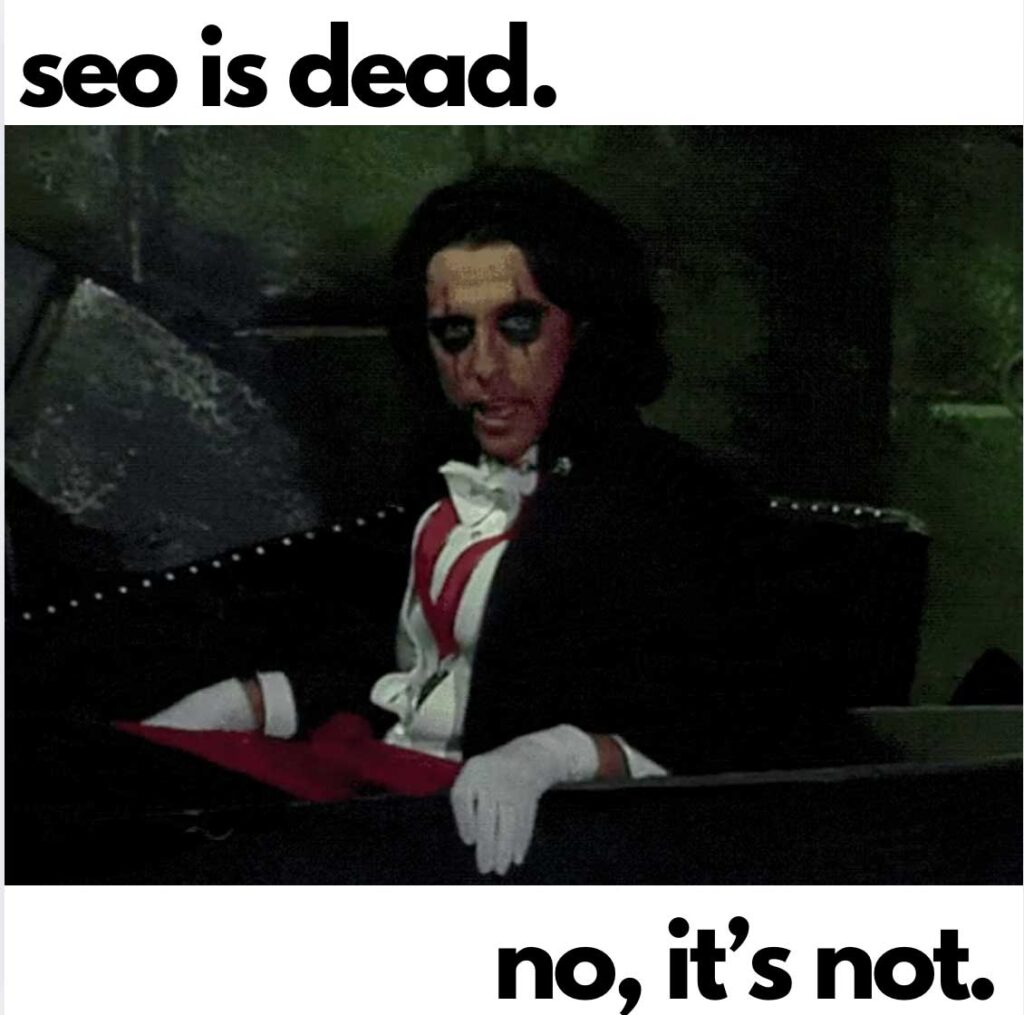
Let’s cut to the chase: the internet is full of people saying that SEO is dead. It’s like the digital version of a bad horror movie, where someone yells, “The monster is dead!” every few years, only for it to pop up again, stronger, meaner, and more powerful than ever.
Spoiler alert: SEO isn’t going anywhere. It’s ALIVE!! kicking, and still one of the most effective ways to make your website relevant. So, let’s debunk the myth, shall we?
Is SEO Really Dead, or Are We Just Overreacting?
Search Engine Optimization (SEO) has been the go-to strategy for driving organic website traffic for over a decade. But here’s the thing—SEO isn’t static.
It’s not some dusty old marketing tactic that’s been left behind. If anything, it’s evolving faster than you can say, “Google algorithm update.”
It’s Evolving, Not Dying
If you’re still clinging to the outdated idea that SEO is just about packing keywords into your content like a bad college essay, you’re in for a rude awakening. Today’s SEO is like a fine wine—it’s matured, more sophisticated, and requires finesse. Modern SEO isn’t just about cramming keywords; it’s about creating quality content that actually answers the user’s question. Mind-blowing, right?
AI, Voice Search, and the Machines Are Here to Help—Not Replace
Have you ever heard of AI and voice search? These two things have been game-changers in the SEO world. As artificial intelligence continues to develop, search engines have become way smarter about understanding the intent behind your search query. It’s no longer just about the words you type into the search bar—it’s about what you really want.
Voice search, on the other hand, has made it all about conversational keywords. You can now search for something by speaking naturally—”What’s the weather like today?”—and expect Google to answer. If your website isn’t optimized for these changes, you’re still writing in HTML 1995 while the rest of the world has upgraded to an innovative, sleek app interface.
Let’s Talk UX: Because Google Is Watching
If you think user experience (UX) doesn’t matter for SEO, think again. Google now penalizes slow-loading sites, confusing interfaces, and mobile-unfriendly designs like it’s a bad Tinder date.
Websites that don’t prioritize a smooth, seamless user experience aren’t just irritating visitors—they’re getting shoved to the back of the digital line. So yeah, SEO is alive and well, but now it’s friends with UX. If you’re not optimizing for both, well… good luck.
As a creative professional navigating the chaotic waters of life and marketing, I’ve observed firsthand the seductive allure of jumping on the trend bandwagon. Before you spend your creative energy on the next big thing, let’s explore why we follow trends. Is it worth being a trendsetter, or should we just stay true to ourselves?

Debunking the SEO Myths: You’ve Been Lied To
So, let’s debunk some SEO myths, shall we? It’s about time we put an end to the nonsense that keeps people thinking SEO is a thing of the past.
Myth #1: SEO Is Just About Keywords
If you think SEO is only about keyword stuffing, let me stop you. SEO is not a game of “how often can I mention ‘best SEO services’ without looking like a lunatic?” SEO now involves context—not just keywords.
We’re talking about creating content that makes sense, answers questions, and provides real value to the user. Google’s algorithm is smarter than your high school teacher, so don’t even try to pull the wool over its eyes.
Myth #2: SEO Is Only About Ranking
Here’s the truth: ranking high on Google means nothing if people land on your site and immediately bounce. People are no longer clicking just because you have the #1 spot.
They want answers, value, and a reason to stick around. SEO is now about driving quality traffic and conversions, not just rankings. A high ranking without engagement is like having a top-tier seat at a concert only for the audience to fall asleep. Yawn.
Myth #3: SEO Is Too Complicated
Okay, yes, SEO is more technical than just slapping a few keywords here and there, but saying it’s too complicated is like saying “learning to cook is too hard” after watching one episode of Hell’s Kitchen.
There are plenty of resources out there, from beginner-friendly tools to expert-level guides, that can help you get a grip on SEO basics. It’s a process, not an impenetrable fortress. Or you could hire an expert, that is flyt. That is what we do.
Myth #4: Social Media Is a Substitute for SEO
Oh, how cute. Some people think social media can replace SEO because it’s a shiny new toy. Don’t get us wrong—social media is fantastic for branding and immediate engagement.
But guess what? SEO brings long-term organic traffic that isn’t reliant on the whims of algorithms and trending hashtags. Social media might get you a quick surge of traffic, but without solid SEO, you’re basically putting all your eggs in a basket full of holes.
Why SEO Is More Important Than Ever in 2025
Let’s get to the heart of the matter. Why is SEO still thriving in 2025? Well, let’s break it down:
Google’s Algorithms Keep Getting Smarter
Whenever you think you’ve cracked the SEO code, Google changes the game with a new algorithm update. And here’s the kicker: Google’s algorithms are better than ever at understanding content, user intent, and context. With updates like RankBrain and BERT, Google constantly improves its ability to deliver accurate, relevant search results. SEO isn’t dying; it’s evolving to match Google’s growing intelligence.
Mobile-First Indexing: Are You Ready?
Google has officially gone mobile-first. This means Google indexes the mobile version of your site before the desktop version. If your site isn’t optimized for mobile, it’s like showing up to a black-tie event in flip-flops. Mobile optimization is a must. If you haven’t made your website responsive yet, let’s say you’re a little late to the party.
Content Is Still King—But Quality Is the Royalty
“Content is king” is a phrase overused to the point of exhaustion. But guess what? It’s still true (we can also say “Content is queen”). Either way, the key to “royal” content is quality. This is not new; we are just stating the long-held facts.
Your content needs to be relevant, well-researched, and user-focused. If it isn’t, it’s not going to perform well. SEO now rewards valuable, comprehensive content that answers the user’s question better than anyone else. DChrunde out posts mean burnt-out posts; they will harm more than help. Don’t waste your time.
Local SEO: Be the King of Your Neighborhood
Want to dominate search results? Local SEO is a massive part of the equation now. Google loves to show users hyper-local results, so if you run a business, you better optimize for local search.
Get your Google My Business profile in order, gather reviews, and make sure your business info is accurate across the web. Otherwise, you’re basically invisible to people searching for your products and services nearby.
How to Keep Your SEO Strategy Alive and Kicking
So, how do you ensure your SEO efforts don’t end up in the graveyard of forgotten strategies? Here’s a cheat sheet for SEO success in 2025:
- Don’t Stuff Keywords: Focus on user intent and context instead.
- Optimize for Mobile: If you haven’t yet, do it today.
- Focus on UX: Fast-loading, easy-to-navigate websites win the race.
- Create High-Quality Content: Don’t just write for rankings—write for the user.
- Keep an Eye on Algorithm Updates: Google changes things all the time. Stay informed.
SEO Is Not Dead—It’s Just Evolving
In case you haven’t figured it out yet, SEO isn’t dead—it’s just getting better. With all the advancements in AI, voice search, and mobile-first indexing, SEO in 2025 is more critical and more complex than ever. It’s not about using outdated tricks to game the system; it’s about creating high-quality content that serves your audience and adapts to new trends. So, if you’ve been wondering whether SEO is dead, it’s very much alive and kicking.
Want to see more fine content to help you on your marketing journey…go here.
